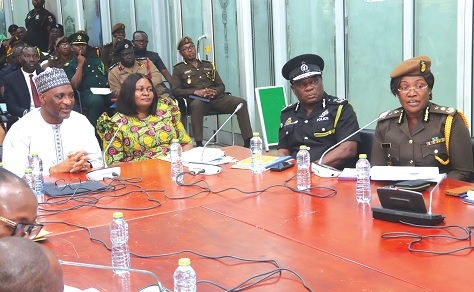The government has approved an increase in the daily feeding fee for prisoners from GH¢1.80 to GH¢5, 15 years after the rate was last reviewed.
The Minister for the Interior, Muntaka Mohammed-Mubarak, disclosed this when he appeared before the Public Accounts Committee (PAC) of Parliament yesterday.
He said the new rate would be captured in the 2026 Budget, following presidential approval, with GH¢10 million expected to be released in the first week of October 2025 to cover the last quarter of this year.
He said in the next budget, GH¢40 million would be made available for the feeding of inmates, with GH¢10 million allocated for each quarter of next year.
“We know that the GH¢5 is not enough, but looking at where we are taking it from, GH¢1.80, to GH¢5 will be a good start, hoping that we will build on it,” he said.
He disclosed after a member of the committee had asked the Director-General of Prisons Service, Patricia-Baffoe Bonnie, how the service had been managing to feed prison inmates with GH¢1.80 for each inmate per day.
The minister said even children who just ate once under the Free School Feeding Programme had GH¢2.50 used to feed each child daily.
“Meaning that for adults, even if we are going to use that same rate, it means the minimum should be about GH¢7.50, but we proposed GH¢10,” he said.
He expressed the optimism that in 2027, the feeding rate should be further improved.
Decongestion
Describing poor inmates’ feeding as “a danger that we are sitting on”, the Asawase Member of Parliament (MP) outlined the various steps taken to decongest the prisons.
He said so far, the government had granted amnesty to 787 first time offenders and a few others, totalling about 900.
Despite that, the prison congestion has just reduced from 36 per cent to 33 per cent, meaning that there is more congestion,” he said.
The minister, however, said if more efforts were made to engage prisons in industrialisation and the Ministry of Education signed a memorandum of understanding for inmates to produce furniture and uniforms, more could be accomplished to improve inmates’ feeding.
Prioritise inmates’ feeding
Mrs Baffoe-Bonnie expressed appreciation to the government for increasing the daily feeding fee for prison inmates from GH¢1.80 to GH¢5.
“If we want to have serious public safety in this country, we have to prioritise the needs of prisoners because they are part of us and they will be with us , and we do not know who next is going to be a guest,” she said.
She said as a director, the service was worried that once the feeding regime was wrong, it could have a ripple effect on health of inmates.
The Chairman of the Human Rights Committee of Parliament, Ernest Yaw Anim, said the current feeding fee violated the minimum prison rules-the Mandela Rule, 22(1)- which required the provision of adequate food for prisoners.
“We call on Mr Speaker to intervene in this and we call for even a minimum of GH₵5 for a start,” Mr Anim said.

